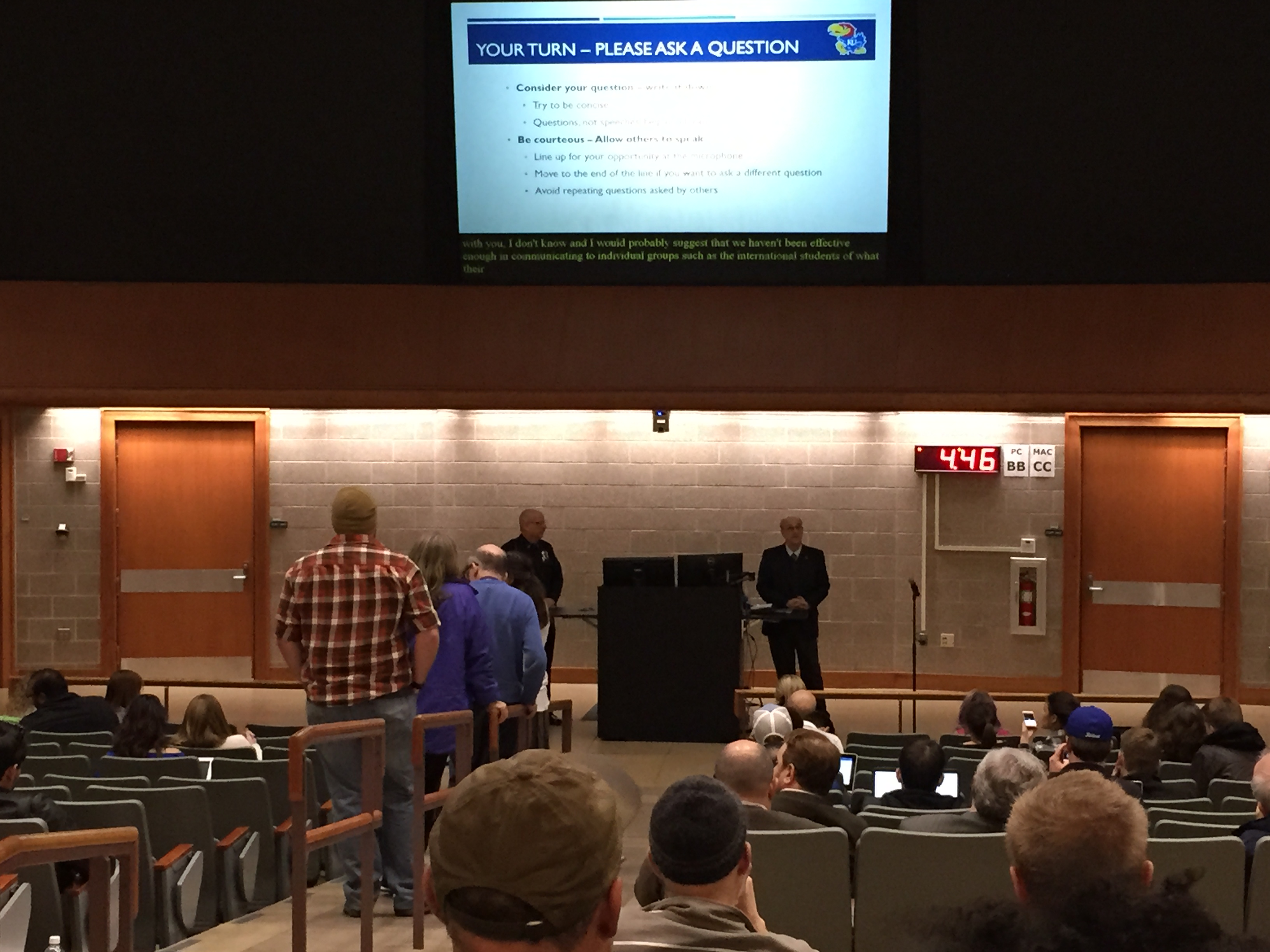About 150 KU community members attend info session on looming campus carry change

University of Kansas Police Chief Chris Keary, left, and associate professor of journalism Mike Williams take questions from audience members during an informational session on campus concealed carry Wednesday, Feb. 15, 2017, in Budig Hall. The event was organized by KU's Office of the Provost. Williams, last year's University Senate president, served on KU's Weapons Policy Advisory Committee.
A campus carry info session Wednesday on the University of Kansas campus was smaller, less heated and yielded fewer unanswered questions than a similar meeting a year ago.
But even now, with KU’s university-wide weapons policy written and approved, there are still some unanswered questions about how the law and policy might apply in various specific scenarios.
Under the Kansas Personal and Family Protection Act, state university campuses must allow the lawful carry of concealed handguns starting July 1.
KU has created a website, concealedcarry.ku.edu, packed with information about the impending change to the law.
The site explains the law and provides information for students, employees and visitors to campus. There are also answers to frequently asked questions and suggestions for what to do in an active shooter situation or how to help someone you suspect of being at risk to harm themselves or others.

University of Kansas Police Chief Chris Keary, left, and associate professor of journalism Mike Williams take questions from audience members during an informational session on campus concealed carry Wednesday, Feb. 15, 2017, in Budig Hall. The event was organized by KU's Office of the Provost. Williams, last year's University Senate president, served on KU's Weapons Policy Advisory Committee.
One of the stumpers at the info session came from associate professor of geology Anthony Walton, who wondered if he would still be able to forbid firearms on out-of-state field trips, including in university vehicles.
Moderators suggested that question be posed to a dean, to get a specific answer from university attorneys.
History department chair Eve Levin asked, since professors must allow guns in their offices, whether there could be a gun-free space for them to go to hold difficult conversations — such as telling graduate students who failed they must leave the program, or faculty members they’re not getting promoted.
Keary said there may be a possibility of such a space on campus where adequate security measures could be temporarily set up to prohibit guns, but that procedures for requesting and approving those kinds of requests had yet to be decided.
Another, somewhat more rhetorical, inquiry that went unanswered during the session came from Chris Tomlin, a shared service center employee. She wondered — assuming someone could be handling a gun in the next cubicle without her seeing it — how many people per year are accidentally shot.
“I would like to know what the odds look like,” she said. “This is frightening to me.”
Other questions involved specifics about what “concealed” means, what types of holsters meet the policy’s requirement, and whether extra “escape doors” could be installed in buildings. A few speakers urged attendees to contact legislators to ask for the law’s repeal.
More than one person asked what KU is doing to encourage training for concealed carriers. Keary said that while police strongly suggest training before carrying any weapon, KU cannot require it under the law.
In December 2015 — before the Kansas Board of Regents or the university had approved policies — an informational meeting organized by University Senate drew about 200 people and saw more heated discourse.
About 150 people attended Wednesday’s event in Budig Hall, organized by the Office of the Provost. The majority of attendees appeared to be faculty and staff.
Wednesday’s session was led by Keary and associate professor of journalism Mike Williams, who was last year’s University Senate president and served on KU’s Weapons Policy Advisory Committee.
Keary said if someone has a gun out, or becomes threatening in any way — involving a gun or not, as always — that people should call the police.
He said that, in talking with colleagues on campuses in other states allowing concealed carry, they have reported few incidents. He also noted that concealed carry has been legal in Kansas for a long time, around town and in restaurants and stores.
“Concealed carry has been around you for 10 years,” he said, “and this is just an additional space it will be around you in the future.”







